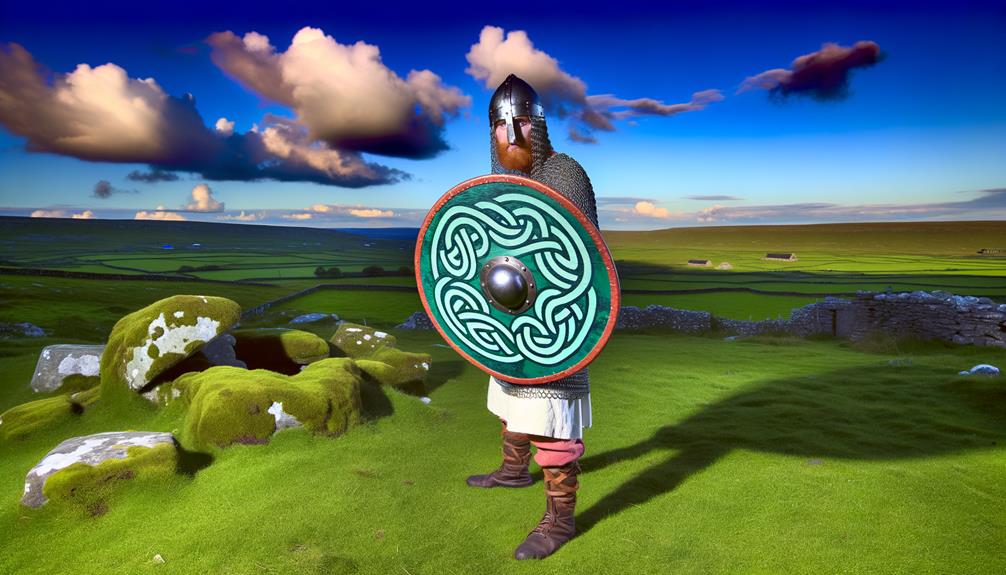Brian Name Meaning and Origin
The name Brian originates from the Old Celtic word 'brígh,' signifying 'noble' or 'high.' Historically prevalent in Ireland, Scotland, and other Gaelic-speaking regions, it has embodied qualities of strength, leadership, and honor. Evidently, it is linked to Brian Boru, the High King of Ireland, symbolizing power and resilience.
The name has maintained its popularity, frequently ranking among the top names in English-speaking countries. Additionally, its cultural resonance is reflected in myths, literature, and popular media, where it often denotes heroism and nobility.
For further details, one can explore its enduring legacy and contemporary usage.

Key Takeaways
- The name Brian originates from the Old Celtic word 'brígh', meaning 'noble' or 'high'.
- It represents qualities of strength, leadership, and honor.
- Historically significant, linked to figures like Brian Boru, High King of Ireland.
- Commonly used in Ireland, Scotland, and Gaelic-speaking regions.
- Popular among English speakers for its strong, timeless sound.
Etymology of Brian
The name Brian originates from the Old Celtic word 'brígh,' which means 'noble' or 'high,' reflecting its historical significance and esteemed usage in Celtic cultures.
Linguistic studies indicate that 'brígh' was employed to denote elevated social status, valor, and nobility. This etymological root underscores the name's association with leadership and honor.
Ancient Celtic societies, particularly during the early medieval period, valued names imbued with such meanings, as they were believed to embody and bestow desirable attributes. The name Brian carries connotations of respect and distinction, resonating through centuries.
Its phonetic stability across various Gaelic dialects further attests to its cultural importance and pervasive usage, making Brian a name rich in heritage and linguistic depth.
Historical Background
Brian's historical prominence can be traced back to the legendary figure Brian Boru, the High King of Ireland, who played a pivotal role in unifying the Irish clans and defending against Viking invasions during the late 10th and early 11th centuries.
Brian Boru's legacy is cemented by his victory at the Battle of Clontarf in 1014, a decisive encounter that notably weakened Viking influence in Ireland. His efforts in consolidating power and fostering a sense of national identity have rendered the name Brian symbolic of leadership and resilience.
Historical records, including the Annals of Ulster, highlight Brian Boru's strategic acumen and his contributions to Irish cultural and political life, making the name Brian synonymous with strength and unity.
Brian in Different Cultures
The name Brian has its origins in Celtic culture, where it was historically associated with nobility and strength, particularly borne by Brian Boru, the High King of Ireland.
In the United States, the name saw a significant rise in popularity during the mid-20th century, reflecting broader cultural trends.
Globally, variations such as 'Bryan' in English-speaking countries and 'Brián' in Spanish-speaking regions underscore its widespread adaptation and enduring appeal.
Celtic Roots and Evolution
Rooted deeply in Celtic traditions, the name Brian has traversed various cultures, evolving in meaning and significance over centuries. Originating from the Old Celtic word 'brígh,' meaning strength or nobility, Brian was popularized by the legendary Irish High King Brian Boru, who united Ireland against Viking invaders in the 11th century. This historical association imbued the name with connotations of leadership and valor.
As the name spread through Gaelic-speaking regions, it adapted into various forms, such as the Welsh ‘Bryan’ and the Breton ‘Bran. ‘ Each adaptation retained the core elements of strength and prestige. Over time, Brian’s influence extended beyond the British Isles, becoming a name recognized and respected in many cultures around the world. The name Brian also holds significance in Irish history and mythology, with the most famous bearer being Brian Boru, the High King of Ireland. In addition to its Gaelic roots, the name has spread to other countries and is recognized in various forms in different languages. The name Brendan meaning “prince” or “little raven” in Irish, is another variation of Brian that has gained popularity in different parts of the world.
American Popularity Trends
In the United States, the name Brian experienced a significant surge in popularity during the mid-20th century, reflecting broader cultural trends and influences. This rise can be traced back to the 1950s and 1960s, a period marked by a fascination with Irish culture and heritage.
Data from the Social Security Administration shows that Brian consistently ranked within the top 20 names for boys from the 1960s through the 1990s. The name's popularity was bolstered by its frequent appearance in media and the arts, contributing to its widespread acceptance.
This trend mirrors the era's broader embrace of traditional, yet distinctive names, which were seen as both modern and culturally resonant.
Global Name Variations
Across various cultures, the name Brian has evolved into numerous distinct forms, each reflecting unique linguistic and historical influences.
In Ireland, the name derives from the Old Celtic 'Brían,' associated with nobility and strength, prominently borne by the legendary High King Brian Boru.
In French-speaking regions, it transforms to 'Bryan,' maintaining much of its original phonetic essence.
The Spanish equivalent, 'Brian,' retains the same spelling but is pronounced with a distinct accent.
Slavic countries, particularly Poland, have adopted variations like 'Borys,' although it is less directly linked in etymology.
In Scandinavian contexts, the name appears as 'Briar,' blending native orthographic conventions.
Such variations underscore the name's adaptability and enduring appeal across diverse cultural landscapes.
Famous People Named Brian
Numerous notable individuals named Brian have made significant contributions across various fields, including entertainment, sports, and literature.
In entertainment, Brian May, the iconic guitarist of the rock band Queen, has left an indelible mark with his musical prowess and scientific achievements.
In sports, Brian Lara, a cricketing legend from Trinidad and Tobago, holds the record for the highest individual score in a Test inning, showcasing his extraordinary talent.
Literature has its notable Brian in Brian Jacques, the British author renowned for his 'Redwall' series, which has captivated readers worldwide.
These Brians, among others, exemplify the name's association with excellence and impact, underscoring the breadth of their contributions to their respective fields.
Popularity Over Time
The name Brian has experienced fluctuating levels of popularity over the centuries, with its prominence peaking during certain historical periods and waning in others. Initially, its use surged in Ireland during the medieval era, particularly due to the influence of Brian Boru, the High King of Ireland. In the 20th century, the name saw a significant resurgence in English-speaking countries, reaching its zenith in the 1970s.
| Year | Popularity Rank (U.S.) |
|---|---|
| 1950 | 66 |
| 1970 | 10 |
| 1990 | 57 |
| 2010 | 117 |
| 2020 | 248 |
This table illustrates the name's trajectory, showing a peak in the 1970s and a gradual decline in recent decades, reflecting broader cultural and naming trends.
Meanings and Symbolism
Emerging from ancient Celtic roots, the name Brian is believed to signify 'noble' or 'high,' reflecting its storied association with leadership and honor.
Historical records trace the name back to Brian Boru, the High King of Ireland in the 10th century, renowned for uniting the island and combating Viking invasions.
The etymology is rooted in Old Celtic languages, where 'brígh' translates to 'noble' or 'strong.'
This symbolism of authority and virtue has persisted through centuries, cementing Brian as a name imbued with a sense of dignity and valor.
The name's enduring appeal is perhaps best understood through its historical connotations, which continue to evoke images of esteemed leadership and noble character in various cultures and contexts.
Modern Usage and Trends
Building on its rich historical legacy, the name Brian has maintained its popularity in modern times, reflecting both cultural continuity and evolving naming trends.
According to data from the U.S. Social Security Administration, Brian consistently ranked among the top 100 names for boys from the 1940s through the early 2000s. While its popularity has waned slightly in recent years, it remains a classic choice.
The name's enduring appeal can be attributed to its strong association with historical and cultural figures, such as Brian Boru, the High King of Ireland. Additionally, its straightforward pronunciation and timeless quality make it a favored option for parents seeking a name that combines tradition with a sense of resilience and nobility.
Conclusion
Coincidentally, the name Brian, with its roots in ancient Celtic origins, traverses a rich historical tapestry, encapsulating diverse cultural significances.
The name's recurrence among notable figures and enduring popularity underscores its profound impact.
From its etymological beginnings to its modern-day usage, Brian embodies a confluence of strength and nobility.
This enduring appeal, evidenced by historical and contemporary trends, underscores a timeless allure, reflecting both individual distinction and collective heritage.






